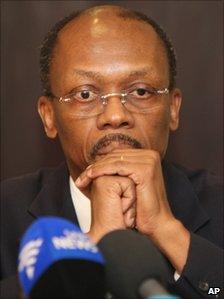Profile: Jean-Bertrand Aristide
- Published

Jean-Betrand Aristide spoke in 2010 of his desire to return
Jean-Bertrand Aristide was Haiti's first freely elected president in 200 years of independence.
But his years in office - and out of it - have been marked by drama.
A bloody rebellion and pressure from the US and France, on top of years of complaints about his second election, led to Mr Aristide being forced into exile for the second time in 2004.
For the past few years, he has lived in South Africa. But the former president has said he wishes and is ready to come home.
Speaking shortly after a massive earthquake struck Haiti in January 2010, he said he wanted to help his country recover from the disaster.
Speculation that Mr Aristide may return was fuelled after the former leader Jean-Claude "Baby Doc" Duvalier unexpectedly returned to Haiti in January after 25 years in exile.
Expectations grew further after the current government issued Mr Aristide with a passport in February.
There have been rallies calling for him to be allowed back, a sign that the former Roman Catholic priest still enjoys great support among some sections of Haitian society.
In 1990, Mr Aristide won the decisive victory which swept him to power as Haiti's first democratically elected president.
Months later he was overthrown in a bloody military coup. He sought exile in the US where he campaigned against Haiti's new military rulers.
His efforts paid off and he was reinstated in 1994 when the military rulers were forced to step down under international pressure and with the help of 20,000 troops, most of them American.
Crises
Mr Aristide was forbidden to stand for a second consecutive term in 1995. But he won in 2000.
With opposition groups boycotting the election, his Lavalas Party took more than 80% of the local and parliamentary seats.
But international observers criticised the poll and the opposition refused to recognise the outcome.
Mr Aristide's second term soon became mired in political, social and economic crises.
A coup attempt in July 2001 was blamed on former members of the military.
Anti-government protests, which had been frequent and ongoing since the 2000 poll, escalated in late 2003 and turned increasingly violent.
Jean-Bertrand Aristide was born in 1953 and educated at a Roman Catholic school and seminary.
He was ordained in 1982 and became a strong supporter of liberation theology, which pressed the church to engage with social problems, including poverty and oppression. In 1986 he helped to establish a home for street children.
A stirring orator, he championed the poor, advocated democracy and campaigned against the dictatorship of Jean-Claude "Baby Doc" Duvalier.
But his political stance and growing support angered Haiti's incumbent leaders, and he was the target of several assassination attempts in the 1980s.
His political activities were also unpopular with church officials. He was expelled from his religious order in 1988 and left the priesthood in 1994. He later married.
Mr Aristide promised to hold parliamentary elections in 2004 and to instigate a programme to help the poor.
But he singularly failed to address political divisions, and under his rule Haiti retained its status as the poorest nation in the Americas.